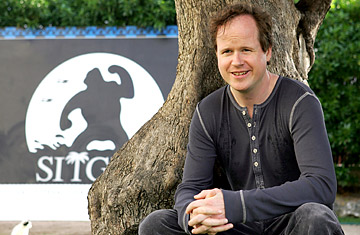
Joss Whedon
Most people who write for TV are not famous. How good of a TV writer must Joss Whedon be, that he is famous for it? The answer is, very good. Whedon — who is also a director-producer-creator person — is the man behind, among other brilliant things, Buffy the Vampire Slayer, Angel, Firefly and Dr. Horrible's Sing-Along Blog (which if you don't know what that is, it's very important that you find out immediately). (Read about Dr. Horrible's Sing-Along Blog).
His new show, which premieres on Fox on Feb. 13, is called Dollhouse. It's about a young woman named Echo (played by Eliza Dushku) who works for a secret organization that imprints her with a new personality every episode. Whedon spoke to TIME this week in New York City, where he was promoting the show.
TIME: I think of your modus operandi as taking on a genre and then remaking it in your own image. With Buffy it was vampires, with Firefly, space opera. But Dollhouse is different. It's its own genre. Unless there's a genre out there I don't know about.
JOSS WHEDON: If there is I'm not aware of it either. So either I've gotten more original, or I've run out of genres to rip off.
Dollhouse is my usual sort of hybrid. But I would call it a thriller, or a drama, before anything else. It's very much a story about this girl's attempt to reclaim her identity, inside of an organization that would perhaps prefer she be stopped. But then within that, because she takes on a different personality every week, there are all sorts of adventures. There's one that's like a whodunit, there's one that's like a caper, there's one that's like a horror movie. We can bounce around.
It reminds me of those Star Trek episodes where they'd all go in the holodeck, and suddenly the show would turn into a Western or something.
JW: Yeah! Maybe I'm reinventing the holodeck genre. The trick is to make it seem more real than Patrick Stewart in a Stetson.
You've always had a great eye for spotting talent. What do you look for in an audition?
JW: Obviously you're looking for a particular spark. I started with Eliza in this case, and so it's great to have that key player in place, because you're also looking for differences. You're looking for different energy — I always think of it for some reason as people holding a quilt. Everybody's got hold of a different end, and they've really got to stretch it taut. You don't want two people who perform the same function.
The other thing that I am very strict about looking for is sanity. If I'm going to potentially spend seven years with this person, I want to make sure that they're the kind of person who's collaborative and easygoing, ready for a challenge, a hard worker. I'm very old-fashioned about the work ethic and the training, and that's a part of it.
This is very much a showcase for Eliza — a new personality every week. It seems like the challenge for her is to transform into a completely different person every episode, and yet maintain some baseline element that we can still recognize as being her, as being Echo.
JW: The thing about Eliza is, it's not like she can turn off the Eliza. She always is her. She has great versatility, and there's lots of different rhythms, and characters, and eras, and social strata she can play, and the way she moves, the way she reacts, she's doing a lot of lovely, subtle work. But at the same time there is that Eliza thing. And that's kind of the premise of the show: no matter how often they tell her who she is, Echo is always in there somewhere, struggling to get out, and to self-actualize. That is Eliza's story, and it's also who she physically is. So the match is perfect.
Do you throw around the word soul at all? Is that the part of Echo that stays constant?
JW: The word soul gets used. We don't open with it, because it's a word that can be overused. But it does creep in in the later episodes. There is definitely something about her, that however many times they may wipe out her personality, she still retains something. And they can't really control that.
